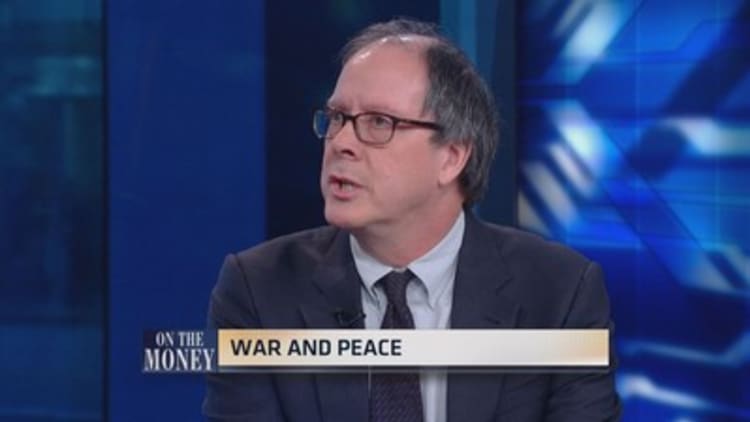When Army veteran Stephen Machuga returned to the U.S. about a decade ago after deployment in Iraq, he didn't like trash day. In Iraq, insurgents embedded explosives in refuse. "You just got used to looking for wires coming out of piles of trash," he recalled.
Back in the U.S., Machuga's mind would start twitching on Tuesdays, when large bags and bins dotted his Pittsburgh neighborhood. This is what civilian life can sometimes be like for a returning veteran.
You try to engineer a new normal. But your brain can't stop imagining dangerous scenarios about your surroundings. And you miss your military buddies. "I definitely had those days, when I drove past a recruiting station, just to see someone in uniform," he said.
His mind itching, Machuga eventually found mental relief in a lifelong hobby — playing video games. "Hey, there's something here," he recalled. Machuga has since transitioned back to civilian life after 13 months in Iraq.
Last November, Machuga used his personal experience and founded Stack-Up.org, a Pittsburgh-based nonprofit that supports veterans through a shared loved of gaming. And last month, Oculus VR founder Palmer Luckey revealed on Twitter he was joining Stack-Up's advisory board.
"Taking care of the people who fought and fight to keep us safe and free is incredibly important, and games, gamers, and the gaming community play an important part in that care," Luckey said in a statement.
Gaming as a stress reliever
Machuga, an occasional gaming blogger — had met Luckey years ago, when he was developing prototype VR goggles.
Read MoreFilmmaker showcases plight of struggling former soldiers
Some veterans can face serious mental health issues on their return including post-traumatic stress disorder. Gaming isn't meant to be an easy fix for veterans, but it can encourage members of the military — regardless of rank — to enjoy camaraderie through a shared hobby, which helps them relax their minds. Video games allow "friendly competition and coordination between people who generally might not talk with one another," Machuga said.
When you're deployed, you can be patrolling or doing dangerous tasks like transporting fuel and other supplies for several hours. But then there's the other 18 hours in a day in which you're pretty much eating, sleeping, lifting weights and waiting for the next assignment.
Any way to decompress and pass time is welcome. And unlike movies, gaming requires interactivity and a higher level of engagement.
"Gaming offers a unique opportunity to relieve the stresses, tensions, and social challenges of being separated from your friends and family while on deployment," said Dean Hall, a game developer and military veteran.
Hall created DayZ, a survival game in which players scavenge for food, water and weapons. Originally from New Zealand, Hall served in New Zealand's army and air force. He has also joined Stack-Up's advisory board.
"Video games were a huge portion of my time off," recalled Machuga, who was also deployed for seven months in Kosovo.

Beyond video games, some groups are using 360 VR to help veterans.
Using VR to connect veterans
In 2015, the Veterans United Foundation announced an immersive, VR collaboration called "Honor Everywhere 360." The foundation is the philanthropic division of Veterans United Home Loans.
Veterans unable to travel were given VR goggles to watch the film, and be virtually transported to veteran memorials in Washington, D.C. The video was produced with partners including Jaunt Studios and Google.
The U.S. loses around 500 World War II veterans each day, and many die before getting the chance to travel to Washington to see the WWII Memorial. "Technology has given our veterans a real chance to see their memorials while confined to their homes, hospital rooms or even beds," said Steve Paulsell, flight director of Central Missouri Honor Flight. His group helps transport veterans to Washington.
Looking ahead, VR could potentially be used to help deployed men and women connect virtually with families back home.
Shipping 'nerd goodness'
The charity name, Stack-Up, refers to a military maneuver in which soldiers "stack up" in single file as they enter a building or room.
The charity is the second nonprofit effort for Machuga, who in 2010 founded Operation Supply Drop, a program developed around sending a crate of video game-themed goods to deployed members of the military. Machuga parted ways with his first charity last year.
Stack-Up now includes a team of a dozen core volunteers, and 18 "stack teams" across the country to help local military communities. Only a few months old, the charity helps assemble care packages filled with video games and "nerd goodness," according to Stack-Up. The supply crates are delivered to veterans in combat zones and on U.S. bases.
And forget 8-bit Nintendos and other outdated consoles. Stack-Up packages have included the latest games, donated from Ubisoft and Electronic Arts. Since its launch, the nonprofit has shipped several dozen supply crates.
Stack-Up is accepting donations of Xbox 360, Xbox One, PlayStation 3 and PlayStation 4, and PC games. And yeah, veterans tend to like video games in general, and gaming related to shooting or sports. Popular titles include the shooter game "Call of Duty."
During one deployment, Machuga said, his all-male infantry received a crate of used Harlequin romance novels. The guys used the books for target practice. Some of them might have been dreaming of Game Boy consoles. Said Machuga, "You have to unplug your brain."
Read MoreMore veterans fill the skills gap at US manufacturing plants


